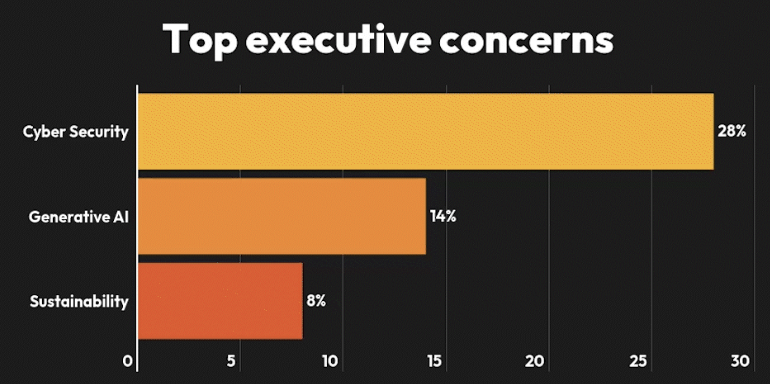
Larger organisations feel more vulnerable 'because they have explored the issues and have a clearer understanding of the threat'

AI continues to be a significant consideration on the C-suite's agenda, according to a new report.
One half (49%) of respondents say it poses a direct threat to their organization, found a survey among 705 C-level executives in the UK, US, Germany, and Netherlands by the IN Group.
And among CEOs, 56% labelled AI as a direct threat.
Geographically, the highest proportion of respondents labelling AI as a direct threat was the US with 57% agreeing, compared with 49% in the UK, 43% in Germany and 35% in the Netherlands.
As a result, recruiting staff with AI skills is a major priority, with 62% of respondents saying they were prioritizing hiring AI experts to capitalize on the advancements of AI technology in the business world, found the survey.
The results ranged by region:
Interestingly, the larger the business, the more they considered generative AI a threat, says the report.
“A case perhaps of larger organizations feeling more vulnerable because they have explored the issues and have a clearer understanding of the threat. They may also view themselves as a higher risk target if they are larger and better known.”
Our research showed some serious concerns around a lack of tech innovation within the business, with 44% of respondents saying they felt they were falling behind. This concern was most prevalent in the US where it was selected by 50%.
Around a fifth (19%) of organizations expressed the need to bolster AI skills specifically around the business application of artificial intelligence to maximize its benefits and mitigate the risks.
However, when it comes to the biggest technology threats, executives are more concerned about cyber security than generative AI, found the IN Group, amid recent reports of data breaches and ransomware attacks across the world.

Source: Investigo
"With ransomware attacks and high-profile data breaches dominating the headlines, C-level executives are increasingly concerned about the threat posed by cybercrime," the report read.
According to the report, business leaders with over 500 employees are less likely to cite cyber security as a concern (23%) compared to leaders with 250 to 500 people (32%).
"This suggests a significant portion of mid-sized companies are well aware of the security threat, but perhaps don't yet have the infrastructure or talent in place to fully address it, while larger organisations are feeling like it is an area they are more in control of," the report read.
The findings come amid warnings that business leaders might be getting overconfident in addressing cybersecurity threats, with Cisco's recent report showing that only three per cent of organisations have reached the "Mature" level of readiness needed to be resilient against cybersecurity risks.
Robert Woodhouse, Director of Technology for Investigo, pointed out that organisations won't be able to address tech-related threats without getting tech leaders in the board rooms.
"Organisations will not be able to address the countless technological threats currently facing their business, optimize their costs or innovate more effectively, until the head of the technology function is a part of the board, viewed as being as important to the business's success as the CFO or CMO," he said in a statement.